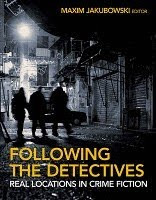Donna Moore,
Declan Burke,
Cara Black and
Paul Johnston's panel called "Natural-Born Killers: Maxim's Picks" (the name honored moderator
Maxim Jakubowski) took meandering paths with brief stops at several interesting destinations.
Moore recalled her childhood admiration for the Nancy Drew books, for the heroine, her handsome boyfriend, her fun friends and young Nancy's car. But then, she said, "I actually read one a few years ago and decided Nancy Drew was a bit of a whiner, her boyfriend was pathetic, and her friends were neurotic. I still liked the car, though." Perhaps you won't be surprised that Moore's first novel,
Go to Helena Handbasket, pokes fun at every crime-fiction cliche Moore could think of.
Burke's comment that "I'm fascinated by the power of the Internet and what it can do" sparked a discussion of that medium's potential, both good and bad, for writers and publishers. Burke works hard to exploit that potential, both in his own fiction and as keeper of the
Crime Always Pays blog. If Ken Bruen and Colin Bateman are godfathers to the current wave of Irish crime fiction, Burke is the godfather of Irish crime blogging, so he knows what he's talking about. Still, the discussion was leavened by a bracing sense of dread and blissfully free of the wifty optimism (pure shite, really) that can infect discussions of consumer technology.
I also quite liked Johnston's comment on writing about a country where one lives but is not a native: "That book I wrote about terrorism in Greece, I don't think a Greek could have written."
=========
The baked cod at the gala dinner in the King's Room was more than acceptable, accompanied by waves of ecstatic verbiage to my left, and graceful acknowledgment to my right. The former came from
Ali Karim, world's most voluble booster of Stieg Larsson (
The Girl With the Dragon Tattoo,
The Girl Who Played With Fire). The latter came from
Reg Keeland, the books' English translator.
Each guest of honor (
Simon Brett,
Håkan Nesser,
Andrew Taylor) gave a short, funny, speech, joyously irreverent of the proceedings. My favorite of the three was Taylor's deconstruction of the prizes he'd been given for each of his many Dagger awards from the Crime Writers' Association. Fook, the gent is twisted.
=========
As a rule, the reporters' notebooks shut when the hotel bar opens. Still, I can't resist mentioning
Kevin Wignall's scintillating impersonation of Marlon Brando as the Godfather, cut short only when Wignall almost swallowed one of the napkins he'd stuffed in his cheeks.
As always, view
the complete CrimeFest program here.
© Peter Rozovsky 2009Labels: Cara Black, conventions, Crimefest, CrimeFest 2009, Maxim Jakubowski, Paul Johnston, what I did on my vacation















